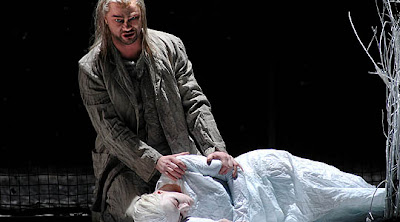Wagner Gala. July 8th 2007. Bavarian State Opera. Soloists: Waltraud Meier, Plácido Domingo, Martin Gantner, René Pape. Conductor: Kent Nagano.
Greeted by more than 20 minutes standing ovations from the entire auditorium, it would be fair to say that yesterdays Wagner Gala at the Bavarian State Opera was an audience success. To be concluded by Waltraud Meier, Plácido Domingo and René Pape appearing on the stairs outside the opera house to greet the approximately 20.000 people watching the show on big screens outside as hundreds of balloons were released in the evening air.
I actually had managed to get a (reasonably good) ticket inside. And everything was kicked off with the Entrance March from the 2nd act of Tannhäuser followed by Martin Gantners fine delivery of Wolfram´s song to the Evening Star.
Then came a non-stop Tristan mix: Prelude-Markes lament-Isoldes liebestod with René Pape quite predictably as the finest King Marke as anyone will ever hear and Waltraud Meier repeating her transcendental liebestod.
After the intermission came what most had been waiting for: Plácido Domingo as Siegmund in a full performance of Walküre Act 1.
Domingo may be 66, and his voice may have lost some power in the top register. Furthermore, he may have looked slightly exhausted as well. Nevertheless, he still manages to be a more convincing Siegmund than anyone I have heard or even heard off, performing on stage today. Waltraud Meier´s Sieglinde is as wonderful as ever and Wotan-in-disguise René Pape was a quite unpleasant Hunding in superb voice.
Even the at times a-dramatic Kent Nagano led an unusually engaged performance.
I actually had managed to get a (reasonably good) ticket inside. And everything was kicked off with the Entrance March from the 2nd act of Tannhäuser followed by Martin Gantners fine delivery of Wolfram´s song to the Evening Star.
Then came a non-stop Tristan mix: Prelude-Markes lament-Isoldes liebestod with René Pape quite predictably as the finest King Marke as anyone will ever hear and Waltraud Meier repeating her transcendental liebestod.
After the intermission came what most had been waiting for: Plácido Domingo as Siegmund in a full performance of Walküre Act 1.
Domingo may be 66, and his voice may have lost some power in the top register. Furthermore, he may have looked slightly exhausted as well. Nevertheless, he still manages to be a more convincing Siegmund than anyone I have heard or even heard off, performing on stage today. Waltraud Meier´s Sieglinde is as wonderful as ever and Wotan-in-disguise René Pape was a quite unpleasant Hunding in superb voice.
Even the at times a-dramatic Kent Nagano led an unusually engaged performance.










